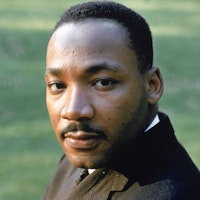All humans are caught in an inescapable network of mutuality, tied in a single garment of destiny. Whatever affects one directly, affects all indirectly.
Martin Luther King Jr.

The Way God’s Universe Is Made
Topic: Society & Civil Religion
All humans are caught in an inescapable network of mutuality, tied in a single garment of destiny. Whatever affects one directly, affects all indirectly. I can never be what I ought to be until you are what you ought to be, and you can never be what you ought to be until I am what I ought to be. This is the way God’s universe is made; this is the way it is structured.
Martin Luther King Jr. was born on January 15, 1929, in Atlanta, Georgia, as Michael Luther King Jr., but later changed his name to Martin. He came from a family of pastors, with his grandfather and father both serving as pastors at the Ebenezer Baptist Church. Martin Luther King Jr. attended segregated public schools and graduated from high school at the age of fifteen. He went on to earn his B.A. degree in 1948 from Morehouse College, where his father and grandfather had also graduated.
After completing three years of theological study at Crozer Theological Seminary, where he was elected president of a predominantly white senior class, King received his B.D. degree in 1951. He then pursued graduate studies at Boston University, where he met and married Coretta Scott. King completed his doctorate in 1955 and had two sons and two daughters with Coretta. Throughout his life, Martin Luther King Jr. played a crucial role in the civil rights movement, advocating for racial equality and justice through nonviolent means. His leadership and inspiring speeches, such as his famous "I Have a Dream" speech, made him a prominent figure in the fight against segregation and discrimination. In 1964, he was awarded the Nobel Peace Prize for his efforts to promote peaceful change and equality for African Americans. Tragically, Martin Luther King Jr. was assassinated on April 4, 1968, but his legacy as a champion of civil rights continues to inspire people around the world.
Wilson, Andrew, editor. World Scripture II. Universal Peace Federation, 2011, p. 1031 [Martin Luther King, Jr.].

Martin Luther King Jr.
Theme: Regenerative Economics

About This Martin Luther King Quotation [Commentary]
In his insightful discussion on interconnectedness, Martin Luther King, Jr. presents the idea that all humans are part of an “inescapable network of mutuality, tied in a single garment of destiny.” He emphasizes how our actions are interconnected, impacting not just those close to us but extending to the global community. This view encourages a comprehensive understanding of how individual decisions affect global economic systems, highlighting the need for economic practices that consider both local and worldwide impacts.
Expanding on this concept, Martin Luther King, Jr. describes a typical morning routine to illustrate the practical reach of economic interdependence. He traces our daily interactions back to a myriad of global connections, each reliant on international cooperation and trade. By showcasing this network, he promotes a vision of economic policies that recognize and respect our global interconnections, advocating for sustainability and equity across all levels of economic activity.
By linking these ideas to the broader ethical and spiritual implications of our interconnected reality, Martin Luther King, Jr. argues that peace and justice are achievable through economic systems that prioritize the collective good. He suggests that regenerative economic models, which support mutual prosperity and uphold human dignity, are essential. This approach to economics, grounded in King’s philosophy, challenges us to reimagine our economic actions as reflections of our ethical commitments to one another.
Additional Martin Luther King Quotes
Practice: Mutuality
“Martin Luther King reminded us how interdependent we are when he wrote: “All men are caught in an inescapable network of mutuality, tied in a single garment of destiny. Whatever affects one directly affects all indirectly.” This web of mutuality King refers to extends even further. As all sentient beings, we’re connected. As all living things, we’re connected. As part of the universe or something greater, we’re connected. This connection is easily forgotten as we go about our daily lives.
As you go about your daily activities, consider how you are part of this wider web. When you eat, consider who and what was required to bring this food to your table. When you get dressed in the morning, consider where the resources for the fabric, the buttons, the zipper came from. Who made these garments? What is their life like? As you walk or ride through your neighborhood, notice the landscape, the roads, the buildings. Notice and honor how we are all interconnected and how contribute or detract from each other’s lives. How can you be more mindful and more supportive of this infinite web and all who contribute to it?
Tell us, how do you practice mutuality?”
―Fetzer Institute [Tools and Practices, Practice: Mutuality].
Resources
Related Quotes
Copyright © 2017 – 2024 LuminaryQuotes.com About Us